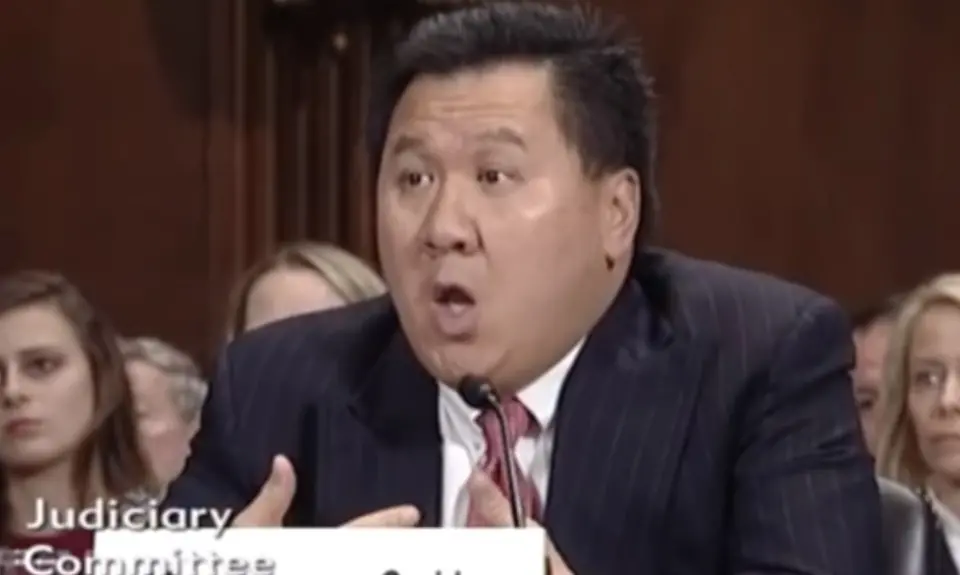“Our Courts, Our Fight” is a blog series documenting the harmful impact of President Trump’s judges on Americans’ rights and liberties and the need for the Senate to confirm President Biden’s federal court nominees to help counteract these effects. Supreme and appellate court cases in the series can be found by issue and by judge at this link.
In a case that shocks the conscience, Trump Fifth Circuit judge James Ho wrote an opinion denying a survivor of sexual assault the right to sue a prosecutor who she contends conspired with the man who raped her in order to avoid pressing charges against him. Even Ho agreed that the situation in Lefebure v. D’Aquilla was “sickening” and “appalling” even as he dismissed the case in an October 2021 ruling.
After flooding forced her to evacuate her home, Louisiana resident Priscilla Lefebure temporarily moved in with her cousin. While there, she contends that she was repeatedly raped by her cousin’s husband, Barrett Boeker, an assistant warden of a Louisiana State Prison. Even though police arrested Boeker, he was never indicted.
This lack of indictment was no accident. After Boeker’s arrest, he and his attorney met multiple times with District Attorney Samuel D’Aquilla. Boeker and D’Aquilla allegedly conspired at these meetings to bury evidence and prevent any investigation of Boeker from moving forward. When Boeker’s case came before a grand jury, D’Aquilla did not call witnesses or present critical evidence, including Lefebure’s rape kit, which could have provided important evidence but which the DA’s office did not even pick up for months.
Lefebure filed suit against D’Aquilla, alleging that his treatment of her case violated her constitutional right to equal protection under the law. Lefurbure claimed D’Aquilla’s refusal to file charges against Boeker was consistent with a larger pattern of discrimination against women, in which his office commonly refused to examine rape kits and investigate reports of sexual assault. Lefebure alleged Boeker knew of these policies due to his law enforcement position and therefore believed he could assault her with impunity.
The district court allowed Lefebure’s case to go forward, recognizing it raised serious concerns of violations of the constitutional rights of Lefebure and other women. On appeal, however, a three-judge panel of the Fifth Circuit reversed and dismissed Lefebure’s complaint in a 2-1 decision by Trump judge Ho.
Ho maintained that Lefebure did not establish D’Aquilla’s actions were a direct cause of her assault, as he claimed was required by prior Supreme Court cases. Ho asserted that the connection between D’Aquilla’s failure to prosecute prior rapes and Lefebure’s assault was too “speculative” to allow the case to move forward. Ho claimed that in essence, the complaint asserted that the DA improperly failed to prosecute Boeker, and that under Supreme Court precedent, “a citizen does not have standing” to challenge the failure to prosecute a third party.
Judge James Graves strongly dissented, maintaining that existing law allowed Lefebure’s claims to go forward. While prior cases bar lawsuits against prosecutors for simply not pressing charges against someone, Graves explained, the Supreme Court has repeatedly recognized the right of victims to sue authorities who improperly fail to protect them against crimes. Graves wrote that Lefebure’s claims are similar to other such cases where courts have held public officials liable for “discriminatory underenforcement” of the law when they refuse to investigate or pursue crimes against groups such as women and minorities. Lefebure’s complaint contends, Graves wrote, that the DA violated her right to “equal protection for crime victims.” Lefebure’s allegation that D’Aquilla’s known policy of failing to prosecute crimes against women helped cause the repulsive attacks against her by a public official was not “abstract or conjectural” under the law, Graves explained, and her case should have been allowed to proceed.
DA D’Aquilla’s actions strike at a core constitutional principle – that all individuals deserve equal protection under the law. Because of this decision by Trump judge Ho, however, prosecutors in Louisiana and beyond will be free to deny women and other groups this protection by selectively refusing to prosecute even the most heinous crimes. This case demonstrates the importance of confirming fair-minded federal judges who will evenhandedly enforce the law in a manner that upholds the constitutional rights of all.
Note: Andrew Kliewer is a law student fellow at People For the American Way.
